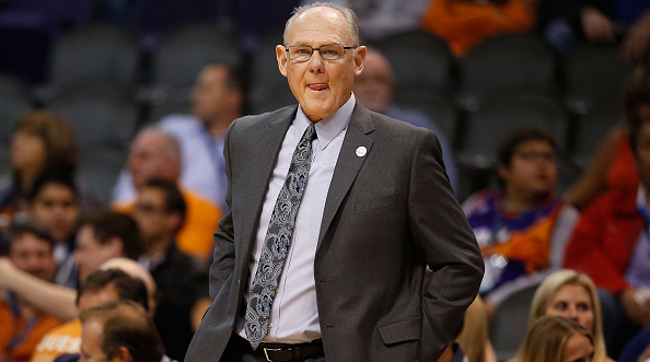
All the publicity surrounding George Karl‘s forthcoming memoir, Furious George, is no accident. Once review copies started making the early rounds, it was obvious the former NBA coach had one agenda in mind: sell a ton of books. Why else would he take so many unnecessary shots at his former players six-plus years after the fact?
Perhaps the backlash from Carmelo Anthony and Kenyon Martin – both of whom Karl accused of being irresponsible due to the lack of a father figure in their lives – will elicit enough disgust from prospective readers that they’ll keep away entirely.
But that hasn’t slowed the media blitz. Closer reads are now revealing even more salacious excerpts, this time about how Karl believes the NBA has a serious steroid problem. Here’s the text of that particular section of the book, via Dan Feldman of NBC Sports:
“We’ve got a more thorough drug-testing program than the NFL or MLB, which we always brag about. But we’ve still got a drug issue, though a different one than thirty years ago. And this one bothers me more than the dumbasses who got in trouble with recreational drugs.
I’m talking about performance-enhancing drugs—like steroids, human growth hormone, and so on. It’s obvious some of our players are doping. How are some guys getting older—yet thinner and fitter? How are they recovering from injuries so fast? Why the hell are they going to Germany in the off-season? I doubt it’s for the sauerkraut.
More likely it’s for the newest, hard-to-detect blood boosters and PEDs they have in Europe. Unfortunately, drug testing always seems to be a couple steps behind drug hiding. Lance Armstrong never failed a drug test. I think we want the best athletes to succeed, not the biggest, richest cheaters employing the best scientists. But I don’t know what to do about it.”
Set aside if you will the obvious suggestion that Kobe Bryant – who made regular trips to Germany during his playing days to get platelet-rich plasma therapy for this knees – was guilty of using performance enhancing drugs.
Having not read the entire book, it remains unclear whether Karl goes on to provide any evidence to support these claims. But compared to other professional sports leagues, like the NFL and the MLB, the NBA has a relatively clean track record in terms of the low number of suspensions for PED offenses. There have been only a few instances in recent years involving second-tier players like Nick Calathes, Hedo Turkoglu, Rashard Lewis, O.J. Mayo, and others.
In the past, critics have argued that may be due to less rigorous testing practices than in other leagues. It’s something that sparked the NBA to introduce blood-testing for human growth hormone (HGH) in the spring of 2015. Under the 2011 collective bargaining agreement, players are subjected to six random tests each year – two in the offseason and four during the regular season – which are scheduled and conducted by an independent third party.
Commissioner Adam Silver has long denied that the NBA has a doping issue, but perhaps Karl’s comments will have an effect that goes beyond his own personal agenda and rekindles the conversation that has for too long been ignored in one of the sports world’s most prestigious leagues.
